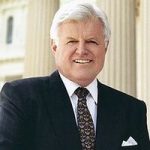Senator Edward Kennedy’s will was recently probated in the probate court in Massachusetts. The document itself is very short. He had previously placed many of his assets into a variety of trusts and blind trusts (because of his public service and the possibility of conflicts of interest) where another party managed those assets.

However, all of his assets were not previously added to these trusts or the probate of his will would not have been necessary. Because he still had assets in his own name, the will was offered for probate. This gives us an opportunity to review some of his estate planning strategies such as who he selected as executor and trustee and many others such as the types of trusts used.
For example, Kennedy was married for a second time and his wife was a lawyer. However, he named a non family member and his son Edward Kennedy Jr as a substitute. More on this later.
We also know, that he created a revocable living trust in 2006 and that the assets remaining in his estate are to be added to that trust and distributed by the trustee of that trust. In many states, this type of trust arrangement offers a number of advantages – including a heightened level of privacy. While such trusts are not widely used in Pennsylvania (because they do not offer all of the benefits that they do in other states that have expensive probate fees or difficult probate systems) they can be beneficial in many circumstances.
Because the will was probated, we also know that he appointed his friend Paul G. Kirk, Jr. as executor and as trustee. He named his son as a substitute and not his second wife. It also appears that he may not have made provisions for his wife’s children (his step-children).
If you are in a similar situation and want more information on the role of the executor and the most common mistakes they make and how to avoid them, please click here to get our free report: The Ten Most Common Mistakes Pennsylvania Executors Make and How To Avoid Them.
Also, for a report giving more details about the types of strategies and techniques used by the Kennedy family and many other wealthy and moderately wealth families to pass on and to protect assets. Please click here to request my report: Enhanced Estate Planning.
The use of trusts often make estate challenges more difficult and expensive. Furthermore, wills will often contain a special clause called an interrorum clause or “no contest clause.” This clause discourages will challenges by revoking the gift to anyone who challenges the validity of the will and/or in some cases trusts or other ways of passing wealth. While this clause does not appear in the Senator’s will, a similar clause may be in the trusts.
As a practical matter, Senator Kennedy’s will is a self proving will. In Pennsylvania we have a similar law that allows you to make your will admissible to probate without having the witnesses appear in court. However, you must verify that in addition to being signed at the end of the will, that the document also contains a special notary “affidavit” signed by the person making the will as well as the witnesses who must also sign in the presence of the person making the will, one another, and the notary.
As for the size of his estate, that will not be known until the executor files an inventory which is required by Massachusetts law. Even then, the picture of Kennedy’s wealth will be incomplete as presumably, many of his assets were already in trust. We also know, that because he was a US Senator, that many assets were held and managed in blind trusts created during his lifetime.
As more details of the Kennedy estate plan and planning strategies become available we will report them to you.



